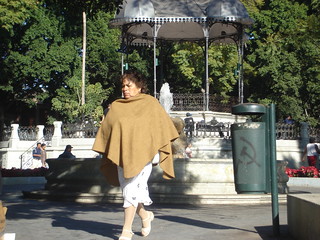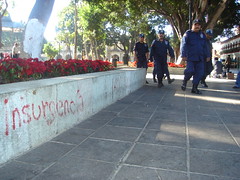PAN dumps Creel as Senate leader
David Agren
The News
Sen. Santiago Creel was sacked as the National Action Party leader in the Senate as the governing party tries to improve its chances of winning approval for a series of reforms to the state-run energy sector.
A Tuesday press release from the PAN national executive committee said, “The PAN is restructuring in order to give a new push to the reforms.”
Creel’s ousting comes as the Senate is holding a marathon session of 22 debates on energy reform – a key initiative in a series of overhauls to the federal government being undertaken by President Felipe Calderón.
The debates, an April takeover of Congress by opposition lawmakers and now a proposed public consultation on energy reform in Mexico City by the Democratic Revolution Party, or PRD, could further impede passage of energy reform.
Analysts were quick to note, however, that Creel’s exit also continued a purge of leaders with loyalties to the conservative wing of the party that was deposed last December by the ascent of Germán Martínez, a close confidant of Calderón, to the PAN presidency.
Pollster Dan Lund, president of the Mund Group in Mexico City, said that Creel, a former interior secretary, was not part of Calderón’s inner circle.
“This is a tightly controlled party, which is not pluralistic and everything functions at the direction of [Calderón],” Lund said.
Sen. Gustavo Madero, president of the Senate finance committee, was named as Creel’s replacement.
Lund described Madero as “one of the president’s men.”
Creel will continue serving as President of the Senate until Aug. 31, according to the Senate press office.
Héctor Larios, PAN coordinator in the Chamber of Deputies, survived Monday’s purge, but acknowledged that he was serving at the pleasure of the party president.
Both Creel and Larios were appointed by former party president Manuel Espino – a longtime Calderón adversary – during the period when Calderón was still waiting for the electoral tribunal to adjudicate PRD complaints from the 2006 vote.
Calderón – who Lund said is calling the shots in the PAN – moved against Espino last fall by having Martínez run unopposed for the party presidency.
Personal indiscretions may have also tripped up with Creel, who had gravitated toward the PAN’s conservative and Catholic factions earlier this decade.
He generated scandalous headlines earlier this month when it was revealed that he fathered a child out of wedlock with a soap opera star Edith González.
Sergio Valderama Herrera, political science professor at UNAM Xochimilco, attributed Creel’s fall to “political and personal shortcomings.
“He broke with one of the PAN’s traditional values: Family,” said Valderama Herrera.
Creel stumbled at times in his PAN leadership position – most notably when he accepted a challenge to debate energy reform with former PRD presidential candidate Andrés Manuel López Obrador. PAN officials later quashed plans for the debate.
Ironically, Creel narrowly lost the 2000 Mexico City mayoral election to López Obrador.
He subsequently served as interior secretary and gained the backing of the PAN establishment, including Former President Vicente Fox, for a 2006 presidential run.
Calderón derailed those plans as he upset Creel in the 2005 PAN primaries, however.





